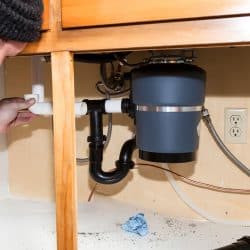In this article down the page yow will discover a bunch of sound expertise in relation to Garbage Disposal Leaking From Bottom.

Waste disposal unit are vital kitchen devices that assist in disposing of food waste effectively. Nevertheless, a leaking waste disposal unit can be an irritating and unpleasant trouble to manage. The good news is, many leaks can be taken care of easily with a couple of straightforward steps. In this post, we will certainly talk about exactly how to repair a dripping waste disposal unit efficiently.
Intro
Waste disposal unit are mounted under kitchen area sinks and are created to shred food waste right into smaller sized items, allowing it to travel through the pipes system conveniently. While these gadgets are typically dependable, leakages can happen with time as a result of wear and tear, loosened connections, or damage to the device.
Typical Sources Of Leakages in Garbage Disposals
Worn Seals and Gaskets
Seals and gaskets play a crucial function in avoiding water from dripping out of the waste disposal unit. Over time, these components can deteriorate, bring about leakages around the disposal system.
Loose Links
The connections between the garbage disposal and the plumbing system can come to be loose in time, creating water to leak out during procedure.
Cracks or Openings in the Disposal Unit
Physical damage to the waste disposal unit, such as splits or holes in the real estate, can also lead to leaks.
Determining the Source of the Leak
Prior to trying to repair a dripping waste disposal unit, it is necessary to identify the source of the leakage. This can normally be done through visual evaluation or by conducting straightforward examinations.
Visual Evaluation
Evaluate the waste disposal unit system meticulously for any kind of signs of water leakage. Pay very close attention to locations around seals, gaskets, and link factors.
Checking for Leakages
One method to test for leaks is by running water with the disposal system and checking for any type of visible indications of leak.
Devices and Products Needed for Dealing With a Leaking Garbage Disposal
Prior to beginning the repair service process, collect the essential devices and materials, including a screwdriver, flexible wrench, plumbing technician's putty, replacement seals or gaskets, and epoxy or patching product for fixing cracks or holes.
Step-by-Step Guide to Dealing With a Leaking Garbage Disposal
Shut off the Power
Prior to trying any kind of fixings, ensure that the power to the waste disposal unit device is turned off to prevent the danger of electrical shock.
Situate the Leakage
Determine the specific area of the leak and establish the cause.
Tighten Connections
Utilize a wrench to tighten any loose connections in between the disposal unit and the plumbing system.
Change Seals or Gaskets
If the leak results from worn seals or gaskets, get rid of the old components and change them with brand-new ones.
Patching Cracks or Openings
For fractures or holes in the disposal device, usage epoxy or an appropriate patching material to seal the damaged area.
Checking the Garbage Disposal After Repair Service
When the fixing is total, test the garbage disposal by running water via it to make sure that the leak has actually been resolved.
Preventive Maintenance Tips to Avoid Future Leaks
To avoid future leaks, it is important to carry out normal upkeep on your waste disposal unit. This consists of keeping it tidy, preventing putting non-food items or tough items down the disposal, and regularly checking for leakages or various other problems.
Conclusion
Finally, fixing a dripping waste disposal unit is a fairly straightforward procedure that can be completed with basic devices and products. By complying with the steps described in this short article and practicing preventative upkeep, you can maintain your waste disposal unit in good working problem and stay clear of costly fixings in the future.
HERE’S HOW TO FIX YOUR GARBAGE DISPOSAL
WHAT TO DO IF SOMETHING IS STUCK IN YOUR GARBAGE DISPOSAL
If the impeller won’t turn, there’s probably something stuck in the disposal. It could be a steak bone or peach pit, although plumbers report pulling all sorts of inappropriate objects out of disposals, such as bottle caps or aluminum foil. Make sure power to the disposal is off, and look inside to see if you can see the source of the jam.
Never stick your fingers in a disposal. Pull out anything you see with tongs or pliers.
If the disposal still won’t work, it may be time to call a plumber or consider buying a new disposal. GEM Plumbing & Heating is here for all of your garbage disposal needs.
WHAT TO DO IF YOUR GARBAGE DISPOSAL DRAIN IS CLOGGED
Take everything out from underneath your sink and put a bucket or other container under your disposal to catch any water that drains out. Disconnect your disposal from the power supply. If it’s plugged into a wall outlet, unplug it. If it’s hardwired into an electrical box, go to the electrical panel and turn off the breaker for the disposal. Pour ¼ cup of baking soda into the drain, followed by ½ cup of white vinegar. Give the solution a few minutes to fizz and do its work. Look into the disposal with a flashlight to see if you can see an object that might be causing the clog. If you see it, remove it using tongs or pliers. MORE TIPS ON DEALING WITH A CLOGGED GARBAGE DISPOSAL
Never use drain cleaner in a garbage disposal. It can damage the plastic parts inside the disposal. You can also be splashed with the caustic liquid while working to clear the clog. Beware! Never stick your fingers into a garbage disposal. Trust us — not a good idea. In many instances, your dishwasher drains through your garbage disposal. This allows the disposal to grind any large food particles that may be drained out of your dishwasher. There are some jurisdictions, however, where the plumbing code prohibits such a connection. WHAT TO DO WHEN YOUR DISHWASHER DRAINS THROUGH THE DISPOSAL
Run some water in the sink so your plunger has at least a ½-inch of water to create a seal and plunge vigorously up and down several times. You may need to repeat this several times. Run hot water down the drain to clear any residue that remains.

We hope you enjoyed reading our excerpt on Why Is . Thanks for taking the time to browse our piece of content. If you enjoyed reading our blog posting if you please remember to share it. I am grateful for your time. Visit us again soon.
Estimate